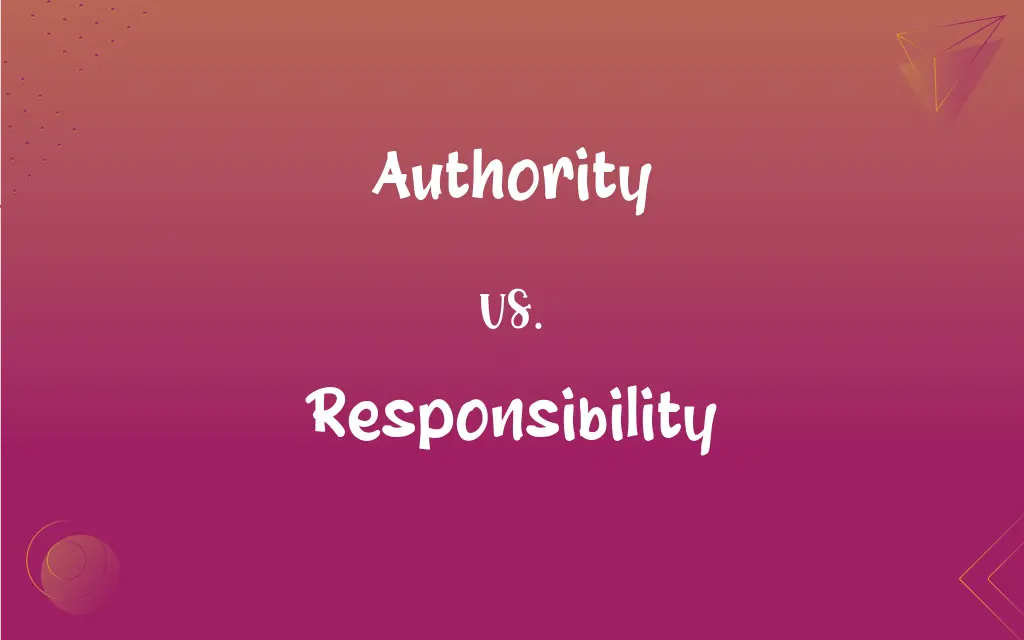Authority vs. Responsibility: What's the Difference?
Edited by Janet White || By Harlon Moss || Updated on October 6, 2023
Authority pertains to the power to make decisions and enforce rules, while responsibility involves being accountable for actions or tasks. Both can coexist in roles but aren't mutually exclusive.

Key Differences
Authority typically refers to the right or power vested in an individual or organization to make decisions and implement them. This can relate to forming rules, making decisions, and ensuring compliance within a specified domain. Responsibility, conversely, doesn’t necessarily imply having power but involves being accountable for one’s actions, decisions, and sometimes, the actions of others.
In certain roles, authority and responsibility might be interlinked, where the person with the power to make decisions (authority) is also the one held accountable for them (responsibility). However, it's not uncommon to witness situations in organizations where authority and responsibility are not perfectly aligned, leading to scenarios where decision-makers are not directly accountable for their choices.
Authority often encompasses the ability to guide, direct, or manage others and is generally designated to specific roles within an organization or system. In such contexts, authority is the legitimate power wielded to shape outcomes or decisions. Responsibility doesn’t always have to be designated and can exist without authority, meaning one can be responsible for outcomes without having the power to make overarching decisions.
In practical applications, a manager may have the authority to assign tasks and implement strategies within a team. Simultaneously, a team member may bear the responsibility to execute the assigned task efficiently, without having the authority to influence broader organizational strategies or decisions. Therefore, authority and responsibility, while often interconnected, have independent applications and implications.
In sum, authority and responsibility are two concepts integral to understanding organizational dynamics and personal accountability. The alignment or misalignment of authority and responsibility within a structure can significantly impact decision-making processes and accountability frameworks, respectively, influencing overall organizational effectiveness and individual performance.
ADVERTISEMENT
Comparison Chart
Definition
The power to enforce and decide
Accountability for actions or tasks
Grammatical Role
Typically a noun
Typically a noun
Associated With
Power and control
Accountability and duty
Implies
Ability to influence others
Obligation to complete a task
Application
Can be organizational or personal
Often individual but can be shared
ADVERTISEMENT
Authority and Responsibility Definitions
Authority
A person or organization cited as a reliable source.
The professor is an authority on ancient history.
Responsibility
The state of having a duty to deal with something.
It is her responsibility to lock the office each night.
Authority
The power to enforce laws, exact obedience, or command.
The government has the authority to impose taxes.
Responsibility
Moral obligation to behave correctly towards or concerning something.
We all have a responsibility to protect the environment.
Authority
The power to influence or direct people's behavior.
As a supervisor, she has the authority to assign tasks to team members.
Responsibility
A thing which one is required to do as part of a job or role.
Filing paperwork is part of his responsibility as an administrator.
Authority
An individual or organization possessing control within a particular sphere.
The health authority issued new guidelines for public safety.
Responsibility
The state of being accountable for something.
He took responsibility for the error in the report.
Authority
A quality of being convincing or knowledgeable in subject matter.
Her book on climate change speaks with authority.
Responsibility
The opportunity to act independently and take decisions without authorization.
With his promotion came more freedom and responsibility.
Authority
The power to enforce laws, exact obedience, command, determine, or judge.
Responsibility
The state, quality, or fact of being responsible.
Authority
One that is invested with this power, especially a government or body of government officials
Land titles issued by the civil authority.
Responsibility
A duty or obligation that one is responsible for.
Authority
Power assigned to another; authorization
Deputies were given authority to make arrests.
Responsibility
An expense, debt, or financial burden that one must pay.
FAQs
Can one have responsibility without authority?
Yes, an individual can bear responsibility for tasks or outcomes without having decision-making authority.
How does responsibility relate to accountability?
Responsibility involves being accountable for actions, decisions, and sometimes overseeing others’ actions.
Can a person refuse responsibility?
Yes, individuals can refuse or negotiate responsibility, depending on the context.
Can authority and responsibility conflict with each other?
Yes, conflicts can arise when authority and responsibility are misaligned or when their boundaries are not clear.
What defines authority?
Authority is defined by the power or right to make decisions and enforce rules.
What is the role of authority in governance?
Authority in governance involves the power to create, enforce, and apply laws and regulations.
How can responsibility be evaluated?
Responsibility can be evaluated based on the successful completion, management, and oversight of assigned tasks or roles.
What does it mean to take responsibility?
Taking responsibility involves acknowledging and being accountable for actions or outcomes.
Can a person have authority without responsibility?
Yes, a person can have authority without necessarily being responsible for the outcomes of decisions made.
How does responsibility manifest in roles?
Responsibility may involve fulfilling tasks, ensuring accuracy, or managing outcomes related to a role.
Is authority always explicit?
Not always, authority can be explicit or implied based on position, expertise, or relational dynamics.
How is responsibility assigned in a team?
Responsibility may be assigned by leadership, mutually agreed upon, or defined by role requirements within a team.
Is authority always vested in a person?
No, authority can be vested in individuals, organizations, or positions.
Is it possible to have varying levels of authority?
Yes, authority can exist in varying degrees and be limited to specific domains or contexts.
How does collective responsibility work?
Collective responsibility involves a group sharing accountability for decisions and outcomes.
What is an example of authority in a corporate setting?
A manager having the power to assign tasks to team members exemplifies authority.
Can responsibility be shared among team members?
Yes, responsibility can be shared or distributed among individuals or teams.
Can authority be delegated?
Yes, authority can be delegated from one person or entity to another.
Can authority be revoked?
Yes, authority can be taken away or modified based on changes in role, position, or organizational structure.
Are authority and responsibility mutually exclusive?
No, they can coexist but can also be independent of one another.
About Author
Written by
Harlon MossHarlon is a seasoned quality moderator and accomplished content writer for Difference Wiki. An alumnus of the prestigious University of California, he earned his degree in Computer Science. Leveraging his academic background, Harlon brings a meticulous and informed perspective to his work, ensuring content accuracy and excellence.
Edited by
Janet WhiteJanet White has been an esteemed writer and blogger for Difference Wiki. Holding a Master's degree in Science and Medical Journalism from the prestigious Boston University, she has consistently demonstrated her expertise and passion for her field. When she's not immersed in her work, Janet relishes her time exercising, delving into a good book, and cherishing moments with friends and family.































































